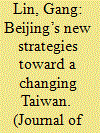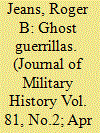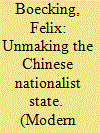|
|
|
Sort Order |
|
|
|
Items / Page
|
|
|
|
|
|
|
| Srl | Item |
| 1 |
ID:
144565


|
|
|
|
|
| Summary/Abstract |
Beijing’s new strategies toward Taiwan are informed by neo-functionalism derived from European experiences, assuming that economic integration will eventually lead to political accommodation and integration. Despite the surprising Sunflower Movement and the fiasco of the Chinese Nationalist Party (KMT) in the 2014 local elections, Beijing will try its best to maintain the momentum of peaceful development of cross-Strait relations. Facing a brand new Taiwan that seems an oddity to the mainland, however, Beijing has adapted to ‘the new normal’ with a slower pace, refocusing on the economic and cultural issues. Whether or to what degree Beijing will change its asymmetric engagements with the two main parties on the island, however, is contingent upon whether the KMT and the Democratic Progressive Party (DPP) can reach a balance of power domestically and whether their policies toward the mainland converge rather than diverge. At any rate, Beijing is likely to pay more attention to ordinary people’s feelings about cross-Strait economic and cultural exchanges and consider quality of cross-Strait exchange as more important than quantity of activities.
|
|
|
|
|
|
|
|
|
|
|
|
|
|
|
|
| 2 |
ID:
153766


|
|
|
|
|
| Summary/Abstract |
After a protracted struggle, in 1949 the Chinese Communists defeated Chiang Kai-shek’s Nationalist armies and took control of the mainland. After the possibility of recognition of the new regime was dashed by Communist mistreatment of American diplomats and other U.S. citizens, the U.S. government adopted a strong anticommunist position. Disgusted with Chiang and his Chinese Nationalist Party, it also turned its back on its wartime ally. Thus opposed to both Communists and Nationalists even before the final Communist victory, it launched a search for viable “third forces” (neither Communist nor Nationalist) it could support instead. Far from an “abstraction,” this quest constituted a powerful theme in the approaches of the Central Intelligence Agency (CIA) and State Department to China during the early 1950s.
|
|
|
|
|
|
|
|
|
|
|
|
|
|
|
|
| 3 |
ID:
103312


|
|
|
|
|
| Publication |
2011.
|
| Summary/Abstract |
The defeat of the Chinese Nationalist Party (Guomindang) in the Chinese Civil War in 1949 is often explained as a consequence of Nationalist fiscal incompetence during the Second Sino-Japanese War, which led to the collapse of the Nationalist state. In this paper, I argue that from 1937 until 1940, GMD fiscal policy managed to preserve a degree of relative stability even though, by early 1939, the Nationalists had already lost control over ports yielding 80 per cent of Customs revenue which, during the Nanjing decade (1928-1937), had accounted for more than 40 per cent of annual central government revenue. The loss of this revenue forced the Nationalists to introduce wartime fiscal instruments, taxation in kind, and transit taxes, both previously condemned as outdated and inequitable by the Nationalists. Further territorial losses led to the introduction of deficit financing, which in turn became a cause of hyperinflation. The introduction of war-time fiscal instruments led to administrative changes in the revenue-collecting agencies of the Nationalist state, and to the demise of the Maritime Customs Service as the pre-eminent revenue-collecting and anti-smuggling organization. The administrative upheavals of the war facilitated the rise of other central government organizations nominally charged with smuggling suppression, which in fact frequently engaged in trade with the Japanese-occupied areas of China. Hence, administrative reforms at a time of fiscal collapse, far from strengthening the war-time state, created one of the preconditions for the disintegration of the Nationalist state, which facilitated the Chinese Communist Party (CCP) victory in 1949.
|
|
|
|
|
|
|
|
|
|
|
|
|
|
|
|
|
|
|
|
|